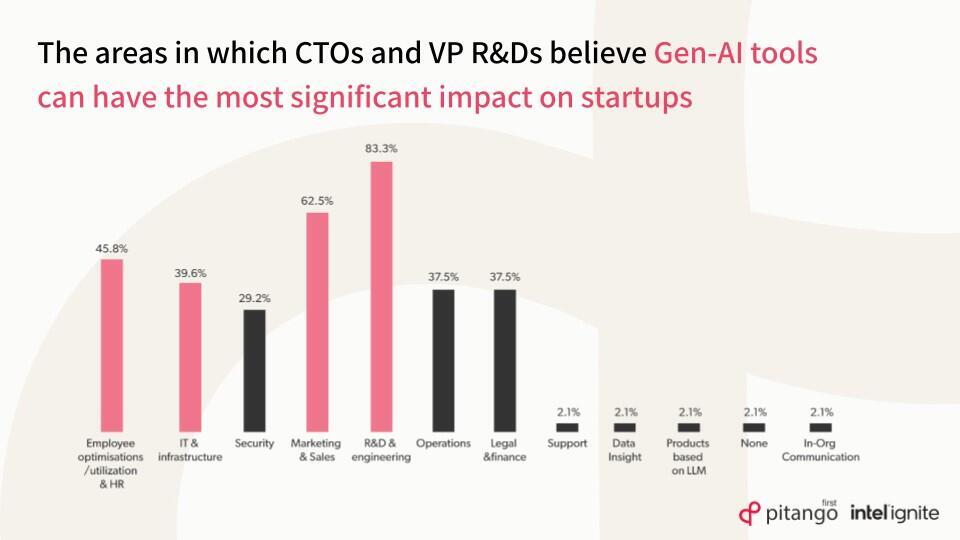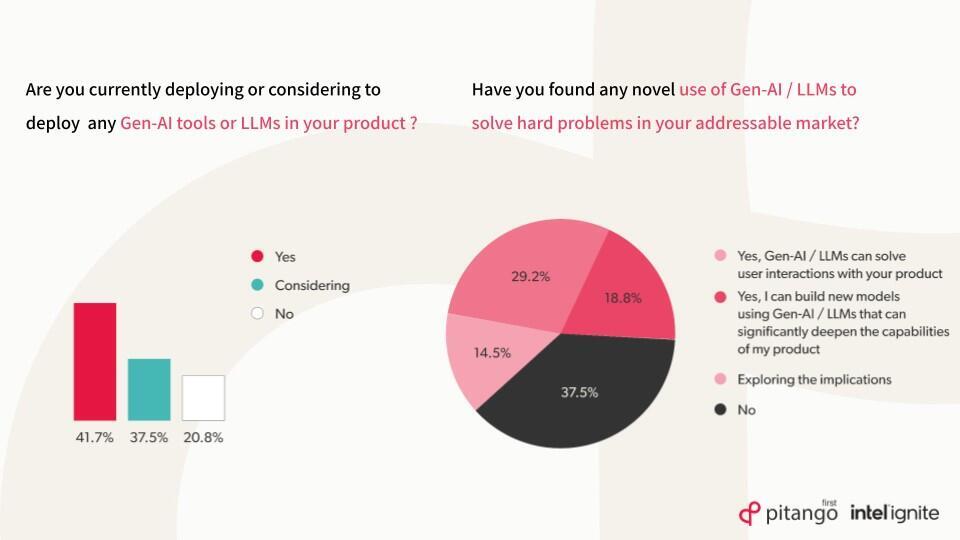TL;DR:
- A recent survey reveals that 85% of CTOs and VPs of R&D plan to adopt Generative AI and LLM technologies.
- LLMs have proven to be effective in solving challenging problems for 60% of respondents.
- Only a few players have the ability to develop and maintain foundational LLM models.
- The deployment of these technologies will significantly impact R&D processes, costs, infrastructure, team structure, and tasks.
- R&D and engineering will be the most influenced areas, followed by marketing and sales, employee utilization, and IT, infrastructure, and operations.
- 40% of respondents have yet to find a use for LLMs to address their “hard problems.”
- LLMs are driving AI’s inflection points and causing a shift in existing industry models.
- Startups have the opportunity to disrupt incumbents by leveraging LLMs and restructuring their operations.
- More than half of CTOs believe that LLMs will become part of their services and products.
- However, the majority have not tested tools utilizing LLMs from small startups.
- The survey includes participants from various industries in the US and Israel.
Main AI News:
A recent survey conducted by Seed, a venture fund, and Pitango First, along with Intel’s acceleration program Intel Ignite, sheds light on the adoption of Generative AI and Language Model Models (LLMs) by CTOs and VPs of R&D.
The survey, which involved 48 industry professionals, revealed that a staggering 85% of respondents either have already implemented or plan to implement GenAI or LLM technologies within their organizations. These technologies are being utilized both externally as part of their company offerings and internally to enhance business operations.
One of the key findings of the survey is that nearly two-thirds (60%) of the respondents have discovered novel applications for LLMs, effectively solving their most challenging problems. Avi Tel-Or, the CTO of Intel Ignite Tel-Aviv, highlights the significance of these LLM models and emphasizes that only a select few players possess the capabilities to develop and maintain them.
Tel-Or likens this situation to the consolidation observed in the chip manufacturing space, where a limited number of players dominate the market. He also draws parallels to the cloud revolution, where infrastructure becomes commoditized, indicating that LLMs are poised to revolutionize the AI landscape.
The survey underscores the belief held by the majority of respondents that the deployment of these technologies will have a profound impact on various aspects of their R&D processes. This includes costs, infrastructure, team structure, and tasks. Notably, 84% of respondents anticipate that R&D and engineering will be the most influenced areas, followed by marketing and sales at 63%, employee utilization at 42%, and IT, infrastructure, and operations at 35%.
However, it is important to note that there is still much to explore regarding the full-scale implications of LLMs. The survey reveals that 40% of respondents have yet to identify a use for LLMs to address their “hard problems” within their respective markets. This suggests that the race to leverage LLMs effectively is just beginning for both startups and established companies.

Source: Pitango First and Intel Ignite Survey
Aviv Barzilay, Senior Associate at Pitango First, acknowledges the transformative power of GenAI and LLMs in driving AI’s inflection points and reshaping existing industry models. Barzilay expresses enthusiasm about the opportunities these technologies present for startups to disrupt established domains controlled by incumbents, among other factors.
Barzilay further observes that the current uncertain macro-environment and reduced availability of capital can serve as an opportunity for startups to leverage LLMs, enabling them to expand their offerings and restructure their operations, development processes, client support, and scalability. It is evident that the entire technology stack is evolving at an unprecedented pace, necessitating decisive and robust responses from companies.
Regarding the integration of LLMs into their offerings, more than half of the surveyed CTOs believe that LLMs will become an integral part of their services and products. However, a significant majority (58%) admit that they have not yet tested tools utilizing LLMs from small startups, indicating untapped potential in this area.
The survey participants represent a diverse range of industries, including financial services, cybersecurity, managed services, retail, pharmaceuticals, and hardware. The CTOs and VPs of R&D surveyed work in both startups and enterprises situated in the United States and Israel. This diversity reflects the widespread interest and adoption of GenAI and LLM technologies across various sectors, underscoring their broad applicability and potential for disruption.




Source: Pitango First and Intel Ignite Survey
Conlcusion:
The survey results indicate a significant and growing interest in the adoption of Generative AI and LLM technologies among CTOs and VPs of R&D. This trend highlights the potential for these technologies to reshape the market landscape across various industries. Companies that embrace and effectively leverage LLMs stand to gain a competitive advantage by driving innovation, optimizing R&D processes, and addressing complex challenges.
Additionally, the survey highlights the need for startups to explore opportunities to disrupt existing domains controlled by incumbents through the strategic utilization of LLMs. As the technology stack evolves at an unprecedented pace, businesses are urged to react decisively and embrace the transformative power of LLMs to stay ahead in an increasingly competitive market.

